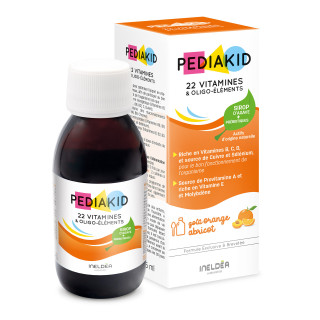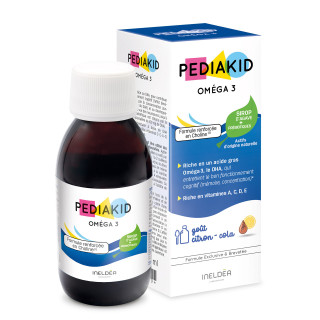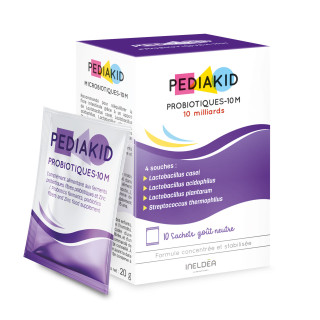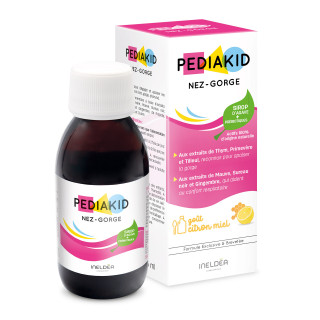- Promo

Rich in vitamin c, d, b1-b2-b3-b5-b6-b8-b9-b12, copper, selenium and iodin for a healthy metabolism
- Promo

Soothes the cough (dry or wet) soothes sore throat made with plant extracts (thyme, plantain, helichrysum, ivy and pelargonium)
With the arrival of winter, we see the return of seasonal illnesses with blocked noses and sore throats. All these problems are usually not serious but they are unpleasant for your child. Let’s see how it might be possible to prevent them and how to treat them if you have not managed to avoid infection.
Why are diseases more common in winter?
Cold is at the root of some diseases but we also have to take into account the resurgence of viruses during the winter period.
Virus propagation in winter
Minor winter illnesses are often caused by viruses that like the cold and this helps them to spread better. Low temperatures help their duplication and, as a result, their transmission. The nose is naturally the first area to be affected as it is most exposed to the cold.
The peak time for epidemics which cause blocked noses and sore throats each year is between the months of November and March. As the sunny days return, viruses die naturally with the heat.
We also have to consider the issue of a weakened mucous membrane and immune system in winter as they are sensitive to temperature changes. However, when the virus becomes installed in the body, the immune system enters into action and triggers a counterattack which involves antiviral defences.
Propagation in confined spaces
Winter changes our way of living and leads us to stay indoors. But the air inside houses is drier and this leads to drying out of the mucous membranes in the nasal passages. In the absence of mucus and nasal secretions which play a protective role, viruses such as the flu or cold viruses, penetrate the body more easily.
This is why it is not advisable to overheat your house or to exceed a temperature of 21°C. Bedrooms should be kept cooler at night, between 18 and 20°C. You should also ventilate every day to bring in fresh air. Add green plant to your decor to help humidify the atmosphere.
Blocked nose, sore throat, what are the minor illnesses children suffer from in winter ?
Winter illnesses are usually harmless but can be highly contagious. Colds, flu, bronchitis, rhinopharyngitis or throat infections, here are a few tips to help your child get over these illnesses.
Remember that the methods of infection are common to all :
- direct physical contact
- indirect contact through toys, furniture or any other object
- the presence in air of contaminated droplets when the child coughs or sneezes.
Colds
The cold virus develops in various forms. It is therefore possible to catch several colds in a row as the immune system has to develop specific defences each time.
A cold shows up as a runny nose, nasal congestion, sneezing, coughing and a mild sore throat. It lasts a week or possibly two on average. If a child’s temperature remains below 38.5°C, there is no need to see a doctor as colds tend to resolve naturally without necessarily having to take medication.
Flu
Flu is a respiratory infection caused by a virus which also take various forms. It spreads like colds and lodges in the nose and throat . On the other hand, flu can present more forcefully and it tires children more. They need a lot of rest for the body to find the strength to defend itself.
Flu leads to a sudden fever. The child develops a dry cough accompanied by a sore throat. The child may feel cold, have a headache and complain of pains and aches throughout the body. It often leads to a loss of appetite.
Room temperature should be no higher than 20°C when the child is resting and it is important that the child is hydrated frequently.
Bronchitis
Bronchitis is an inflammation of the bronchi which leads to a dry cough that can go on for a couple of weeks. The fatigue is often very bad but the disease does not necessarily cause a fever.
Bronchitis is frequently a complication of flu or cold which spreads to the bronchi. It often calls for a visit to the doctor, especially if the child has difficulty breathing.
Rhinopharyngitis
Rhinopharyngitis is an illness that does not require treatment with medication. It can be rather spectacular as the child has a runny nose and yellow and green coloured material flows out but, contrary to what might be thought, this is a sign that unwanted materials are being eliminated.
It is important to humidify the room to reduce coughing and to keep the child well hydrated.
Throat infections
A throat infection is characterised by a sore throat, sometimes so painful that it becomes difficult to eat and even to swallow. Throat infections are easy to spot from the glands in the neck and redness at the back of the throat. They can be viral or bacterial in origin. In the latter case, antibiotic treatment is necessary.
Do not put off going to the doctor. This is not a serious illness but it will not go away without medication. The doctor will carry out an examination to check for streptococcus and establish whether it is a case of erythematopultaceous pharyngitis (“white angina”) or erythematous pharyngitis (“red angina”).
It is vital to keep your child well hydrated. Avoid food that is too hot which reignites the pain and opt for soft or even liquid food such as purees and soups. `
Some advice on how to prevent winter illnesses
The first measure is not limited to winter but should be a daily habit. This concerns hygiene and, in particular, washing hands to remove disease-causing germs.
Ventilating your house is essential to remove all viruses which thrive in confined spaces. The temperature, as we mentioned earlier, should not exceed 20°C. In winter it is normal to wear a jumper and it is not advisable to increase the heating so that you can live in a T-shirt.
Sleep is also important. The immune system of a tired child loses its power and its efficacy.
Food and food supplements
Food is our body’s fuel and builds our immune defences. It can contain all the necessary vitamins, minerals and nutrients we need. To prevent winter illnesses, you can boost your child’s system by giving precedence to certain foods or turning to natural health products.
- Vitamin C is the champion vitamin to fight off winter illnesses. It is found in oranges, kiwis, grapefruit, broccoli, etc.
- Vitamin E boosts the immune system. It is also found in milk, eggs, sunflower oil, sweetcorn, soya, etc.
- Vitamin A, from beta-carotene, is also vital. Courgettes, sweet potatoes and spinach are excellent sources.
- Zinc, found in dairy products, beans, meat and fish, seafood, nuts and cereals, helps the body to resist winter viruses better.
We get the full quota of vitamins with 22 VITAMINS & TRACE ELEMENTS which includes plants but also effective vitamins and minerals for an optimum supply of essential micronutrients in order to help the body function well and for good general balance.
Runny nose, blocked nose and a tickly throat? Turn to PEDIAKID NOSE-THROAT syrup which combines a set of natural and effective active ingredients to soothe and unblock the airways (nose, throat, bronchi, etc.) from the very first signs.
A cough starting? Whether it’s dry or productive, opt for PEDIAKID DRY & PRODUCTIVE COUGH syrup which is totally suitable for children from the age of six months.
As far as possible, avoid rushing to the doctor each time your child has a blocked nose or sore throat. The child’s immune system needs to be naturally boosted and it is not unusual to succumb to a few harmless infections during winter.




